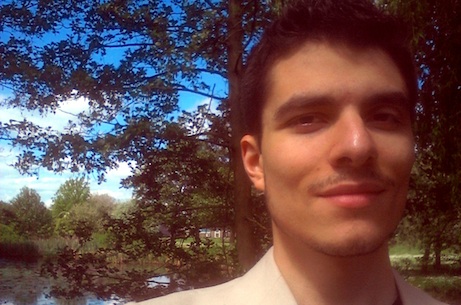
Christian Boehm is lead author on a paper on the development of a new way of constructing complex genetic circuits.
Researchers led by a Gates Cambridge Scholar have developed a new way of constructing complex genetic circuits which could fundamentally transform how we confront everything from environmental pollution to cancer.
The emerging field of synthetic biology draws from principles adopted from engineering and information technology. It involves the use of standardised parts of DNA to build genetic circuits which can re-programme living cells to fulfil a variety of tasks. Applications range from the efficient synthesis of pharmaceuticals and biofuels over sensing and remediation of environmental hazards to the targeted killing of cancer cells in the human body.
In a study entitled ‘Rapid construction of insulated genetic circuits via synthetic
sequence-guided isothermal assembly’, just published in the journal Nucleic Acids Research, Christian Boehm [2013] and colleagues report a new way to rapidly and efficiently construct genetic circuits so that constitutive building blocks do not interfere with each other. This is an important step towards enabling synthetic biologists to robustly construct genetic circuits of increasing complexity.
A major aim of the synthetic biology community is to make biology easier to engineer by generating a collection of clearly defined, standardised genetic modules which may be joined together in a plug-and-play fashion to create ‘circuits’ within living cells that enable them to perform specific functions. Standard parts are important because they can be easily reused or repurposed between circuits.
Standardisation
To implement functions of increasing complexity, scientists require methods for the rapid, efficient and parallel assembly of multiple standardised genetic parts into functional circuits. In this context, insulation, or the degree to which the activity of a genetic part is independent of the context or presence of other parts, is particularly important because it ensures that part activity is consistent between circuits. Owing to the need for standardisation, repeated genetic elements commonly rub up against the parts of the synthetic circuits. This is problematic because it may prevent parts from becoming joined together in a specific order. Parts assembled in a random sequence may render the circuit un- or dysfunctional.
To address this issue, Christian and colleagues at Harvard University developed a method for the rapid one-step assembly of multiple genetic parts into functional circuits which deliver well-insulated individual modules. They designed a set of DNA sequences (called ‘unique nucleotide sequences’, or ‘UNSes’) which spontaneously and robustly assemble in a specific order. UNSes can be attached to the termini of any genetic part.
They illustrated how their DNA assembly system could be robustly used in a variety of cell types, including microbes and mammalian cells. For example, UNSes can be used to assemble genetic logic gates [a basic building block of any digital circuit] which are integrated into the chromosomes of mammalian cells. The application of genetic circuits in mammalian cells is of interest due to its potential for analytical, therapeutic and diagnostic applications in the context of biomedicine.
Applications
The researchers expect UNS-guided assembly to have a significant impact on the way synthetic biologists will construct genetic circuits in the future. They say: “Our assembly scheme can speed the design-build-test cycle for complex circuits with repeated genetic elements and we anticipate that this approach will be employed for a wide range of applications where multigene assembly and insulation are desired. These include the construction and optimisation of complex metabolic pathways, the development of genetic timers and counters and the construction of multi-input logic gates.”
The study in Nucleic Acids Research is based on Christian’s previous research at Harvard and follows the publication of Design of a prototype flow microreactor for synthetic biology in vitro reported in Lab on a Chip three months earlier. A third paper is pending publication.
As a new Gates Scholar and PhD candidate in Plant Synthetic Biology at the University of Cambridge, his future work will focus on applications aimed at promoting sustainability. Since graduation from high school, Christian has worked with a number of sustainability think tanks, NGOs, and scientific bodies and has chosen to come to Cambridge to integrate his passions for applied bioscience and sustainability.
He says: “Plants represent an extremely attractive platform for biological engineering. They are capable of capturing carbon dioxide from the atmosphere and utilise sunlight as a source of energy to produce a range of important compounds, including drugs and biofuel components. Needless to say, plants are also the primary food source on our planet, so technologies that enhance their metabolism may not only enable sustainable bioproduction and alleviate climate change, but help support a rapidly growing world population.”












